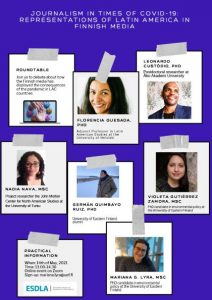Journalism in times of Covid-19: Representations of Latin America in Finnish Media

We share the recording from our virtual roundtable held on Friday, May 14th, 2021. This roundtable was a continuation of the collaboration that ESDLA seeks to establish with researchers and the public in Finland and the Nordic Countries interested in Latin America.
Thanks to all the people who participated. But if you miss it, you can find the recording here:
Information about the roundtable:
Amidst the COVID-19 pandemic, journalists have the challenging task of gathering and distributing accurate and reliable information. This task becomes more critical and demanding when journalists create international news coverage of distant crises. In recent months, Brazil, Mexico, and other Latin American and the Caribbean (LAC) countries have been in the sights of world journalism due to the rise in the numbers of contagion, deaths, and the different responses and strategies of the governments in turn. In this round table, we have invited several Latin American researchers based in Finland to discuss how the Finnish media has displayed the consequences of the pandemic in LAC countries. How can specific representations affect popular ideas and normalize preconceptions of such distant crises? What is the role of social science researchers in creating more accurate and reliable information, and what are their limitations? Join us in the discussion!
Participants:
Nadia Nava Contreras is a project researcher at the John Morton Center for North American Studies at the University of Turku, where she is part of the Cubaflux project that investigates urban visual transformations in Post-Deténte Havana. She is also a doctoral candidate in political history at the University of Helsinki. Her dissertation investigates diplomatic encounters and mutual imaginaries in the relations between Mexico and Finland during the 20th Century.
Florencia Quesada Avendaño, PhD, Docent is a trained historian, currently Adjunct Professor in Latin American Studies at the University of Helsinki. She has been a researcher and lecturer in Global Development Studies, World Cultures, and at the Helsinki Collegium for Advanced Studies (HCAS), UH. Quesada’s research interest includes cultural urban and architectural history, sustainable tourism, socio-spatial segregation, and urban violence in Central America.
Leonardo Custódio is an Afro-Brazilian postdoctoral researcher at Åbo Akademi University and coordinator of the Anti-Racism Media Activist Alliance (www.armaalliance.com). He is also coordinator of the Activist Research Network and editor-in-chief of raster.fi, website of the Finnish Anti-Racist Research Network. Custódio is co-editor of “Research Traditions in Dialogue: Communication Studies in Europe and Latin America” (2020, Media XXI) and author of “Favela Media Activism: Counterpublics for Human Rights in Brazil” (2017, Lexington Books).
Germán Quimbayo Ruiz is from Bogotá, Colombia. He recently finished his Ph.D. in Environmental Policy at the University of Eastern Finland, Joensuu. His work and research focus on environment/society relationships and their interplay with urbanization and socio-ecological inequalities, exploring their role in spatial planning practices in defense of commons such as biodiversity. Before his Ph.D. studies, he worked with local environmental organizations and institutions in Colombia.
Mariana Galvão Lyra is a sustainability researcher and consultant. Currently, she is a project researcher at the business school of the University of Eastern Finland. Her main research interests are sustainable science, stakeholder management, company-community conflicts, and activism against mining projects, especially in developing countries. In particular, she is interested in shedding light on the groups fighting for social and environmental justice.
Violeta Gutiérrez Zamora is a sociologist and Ph.D. candidate at the Department of Geographical and Historical Studies of the University of Eastern Finland. In her research, she focuses on rural organizations, community forestry, feminist political ecology, and eco-governmentality in Mexico.